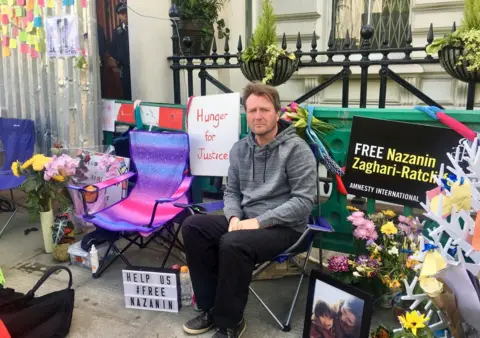Nazanin Zaghari-Ratcliffe: Husband speaks after six days of hunger strike
 BBC
BBCRichard Ratcliffe's voice is barely a whisper, the skin on his face is cracked and red, and, on a sunny day in June, his handshake feels unnaturally cold.
It is almost a week since Mr Ratcliffe went on hunger strike in protest at the ongoing detention of his wife, Nazanin Zaghari-Ratcliffe, in Iran.
During that time, he has been sleeping in a tent outside the Iranian embassy.
The last food he ate was peach and yoghurt on Saturday morning.
Since then, all that has passed his lips is water and mint tea, he says, and the effects are showing.
"I'm more tired, I get slow-witted," he says. "My voice has got quieter and I get more bad-tempered."

Mrs Zaghari-Ratcliffe was jailed for five years in 2016 after being convicted of spying, which she denies.
Iran has refused repeated calls from the British government to release her.
Amid escalating tensions between the two countries, Foreign Secretary Jeremy Hunt last week urged Iran to "do the right thing" and release Mrs Zaghari-Ratcliffe.
She and her husband have both gone on hunger strike to put further pressure on the Iranian authorities for her unconditional release.
But Mr Ratcliffe is under no doubt that the hunger strike has been harder for his wife.
"On Monday she was quite stressed. The physical effects were hitting her. She was saying she was feeling a lot slower, kind of sluggish and [feeling] different pains," he says.
'Enough is enough'
In addition to the physical toll of not eating, living in a tent outside has also brought challenges for Mr Ratcliffe.
He has to shower in a cafe nearby and has had difficulties sleeping at night.
"On night one, I didn't sleep at all. I gradually got better and better at sleeping, so last night I slept quite well," he says with hooded eyes.
Mr Ratcliffe blames the sleepless first night on nervous tension, rather than the living conditions.
But he says friends and relatives who have been on a visiting rotation have found the conditions challenging.
"They all stay for one night, they get no sleep and are left very bleary-eyed.
"But I gradually got used to it," he adds.
 AFP PHOTO / FREE NAZANIN CAMPAIGN
AFP PHOTO / FREE NAZANIN CAMPAIGNMr Ratcliffe does not yet know when he will stop the hunger strike.
"I'm not planning on dying," he says.
"I'm doing it as long as Nazanin is doing it. [We] want to make the point that enough is enough.
"It's open-ended. Nazanin will decide. I'm hoping it's not weeks and weeks, but it's in her hands."
Mr Ratcliffe insists that he has not yet felt any major physical effects.
From his conversations with supporters who themselves have been on hunger strike before, he mentions risks of malnutrition that he has been warned to look out for.
"Some of the people who've been on hunger strike before have asked 'has your hearing gone strange? Are there strange things in your eyes?' None of that has happened to me yet," he says.
Those people make up a number of supporters - from Iranian activists to British MPs - who have visited him outside the embassy.
'Catalyst for stories of injustice'
Mr Ratcliffe said he had been deliberately focusing on the positive aspects of his protest - such as the bouquets of flowers surrounding him, illustrating the "footfall of care" from supporters - rather than the hunger.
"We've had lots of Iranians come who've shared their own stories of home in Iran and imprisonment," he says.
"So we've almost been a catalyst for wider stories of injustice, which has been quite profound to live through. That's been a more arresting experience [than the hunger].
"People coming down is really important for the Iranian embassy to see - but also for our morale, for Nazanin's morale - for it to be seen as a continued concern."
